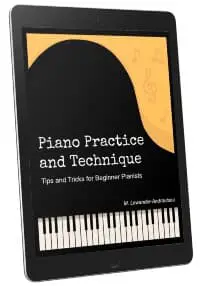- Home
- Piano Playing Q&A
- What Does it Feel Like When the Piano is Played Correctly?
What Does it Feel Like When the Piano is Played Correctly?
by Carolyn Topliff
(New York)
I would like to hear your explanation of how it feels when the piano is played correctly and really well.
How does the body feel from head to toe? I know that excess tension and overuse, downward pushing of the forearm or too much arm weight release can create a drag when trying to move quickly across the keyboard in speed.
Staying too long at the bottom of the key or continuing to push at the completion of the
key stroke can make it difficult to move rapidly through fast passages and leaps, and still keep the accuracy going.
From studying the Alexander Technique I have learned where I hold tension in my body. This tension keeps me from playing the piano with freedom and ease.
Any thoughts you can share that would assist me in getting a clearer mental picture and correct physical feelings would be greatly appreciated.
Thank you.
Maria’s answer:
Your question immediately makes me associate to the term “Flow” coined by Psychologist Mihaly Csikszentmihalyi's in his famous investigations of "optimal experience" as a way to describe a particular state of consciousness. “During flow, people typically experience deep enjoyment, creativity, and a total involvement with life”. Facilitating Flow Experiences Among Musicians
It also makes me think about the expression being “in the zone” by many, especially jazz, musicians, for the feeling of freedom of tension and constraint in both body and mind to reach that state of inner peacefulness, so necessary for freedom of creative playing and improvisation.
In my experience, when playing in this state of “flow” or being “in the zone”, I don’t feel any physical awareness at all! My mind is so totally absorbed in the expression and beauty of the music, that time and room simply cease to exist. Now, for me this feeling usually doesn’t last very long, but I am sure it can be practiced!
Mildred Portney Chase writes in her beautifully poetic book “Just being at the Piano” (1985)
“Nowhere is it more important to be in the here and now than in playing the piano. The slightest lapse in attention will affect every aspect of how I realize the recreation of a piece of music. One note, coming a hair’s breadth late in time, may distort the expression of a phrase. It is impossible to be self conscious and totally involved in the music at the same time. Consciousness of self is the barrier between the player and the instrument.”
“With the piano, body movements always play a part. You need to move in order to create the sound. A feeling of oneness with the instrument is an ultimate requirement. This will express itself in beautiful movement, that is coordination, and will represent a state of harmony within the person. Any tension that disturbs this state of harmony will hinder the natural movement.”
The Alexander technique is a wonderful tool to learn to become aware of unnecessary movement patterns and tension and to learn to achieve a “relaxed attentiveness”. Flow and Alexander Technique
Nelly Ben-Or is a pianist and a Alexander technique teacher, I had the honor and privilege of meeting and talking to her during an Alexander technique seminar here in Greece some years back. She writes:
“I would therefore suggest that learning to play a piece of music should consist firstly of absorbing with utmost clarity and precision all the details of the text (preferably away from the instrument) and learning to see it in relation to it’s constantly flowing placement on the keyboard.
Then, providing one has experience and understanding of “directing” (in Alexander’s sense of the word) one should give one’s hands to the keyboard and listen to the required sound rather than try to force or strike it out of the instrument.”
From: “A Pianist’s Thoughts on the Alexander Technique”, by Nelly Ben-Or. Article published in the Alexander journal, authumn 1978; by the Society of Teachers of the Alexander Technique.
Recommended resources:
Just Being at the Piano
Flow: The Psychology of Optimal Experience
Effortless Mastery: Liberating the Master Musician Within
The Inner Game of Music
